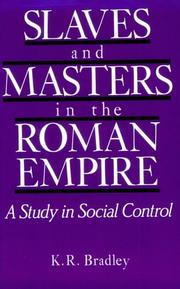| Listing 1 - 7 of 7 |
Sort by
|

ISBN: 019520607X Year: 1987 Publisher: Oxford Oxford University Press
Abstract | Keywords | Export | Availability | Bookmark
 Loading...
Loading...Choose an application
- Reference Manager
- EndNote
- RefWorks (Direct export to RefWorks)
Slavery --- Social control --- Esclavage --- Contrôle social --- Rome --- Social conditions --- Conditions sociales --- Social control. --- Social conditions. --- Contrôle social
Book
ISBN: 9781487548810 1487548818 9781487548896 9781487548902 1487548893 1487548907 Year: 2024 Publisher: Toronto ; Buffalo ; London : University of Toronto Press,
Abstract | Keywords | Export | Availability | Bookmark
 Loading...
Loading...Choose an application
- Reference Manager
- EndNote
- RefWorks (Direct export to RefWorks)
"Marguerite Yourcenar is best known as the author of the 1951 novel Mémoires d’Hadrien, her recreation of the life of the Roman emperor Hadrian. The work can be examined from the perspective of the issues raised by writing Roman imperial biography at large and the many ways in which Mémoires has a claim to historical authenticity. In Marguerite Yourcenar’s Hadrian, Keith Bradley explains how Mémoires d’Hadrien came to be written, gives details on Yourcenar’s own biography, and describes some of the intricate historical problems that her novel’s portrait of Hadrian presents. He draws on Yourcenar’s correspondence, her interviews with journalists, and her literary corpus as a whole, emphasizing Yourcenar’s profound knowledge of the ancient evidence on which her life of Hadrian is based and exploiting a wide range of contemporary Yourcenarian criticism. The book pays special attention to the methods by which Yourcenar believed Hadrian’s life history to be recoverable, compares examples of modern life-writing, and contrasts the procedures of conventional Roman biographers. Revealing how and why Mémoires d’Hadrien is as it is, Marguerite Yourcenar’s Hadrian illustrates how imaginative literary recreation is often little different from historical speculation."
Yourcenar, Marguerite (1903-1987). --- Yourcenar, Marguerite. --- Yourcenar, Marguerite --- Hadrian --- Criticism and interpretation. --- In literature. --- Hadrian,
Multi
ISBN: 9780511815386 9780521372879 9780521378871 Year: 1994 Publisher: Cambridge Cambridge University Press
Abstract | Keywords | Export | Availability | Bookmark
 Loading...
Loading...Choose an application
- Reference Manager
- EndNote
- RefWorks (Direct export to RefWorks)
Book
ISBN: 9026003919 902600396X Year: 1974 Publisher: Oostmalle De Sikkel
Abstract | Keywords | Export | Availability | Bookmark
 Loading...
Loading...Choose an application
- Reference Manager
- EndNote
- RefWorks (Direct export to RefWorks)
Book
ISBN: 1316183149 1316183629 0511780346 Year: 2011 Publisher: Cambridge : Cambridge University Press,
Abstract | Keywords | Export | Availability | Bookmark
 Loading...
Loading...Choose an application
- Reference Manager
- EndNote
- RefWorks (Direct export to RefWorks)
Volume 1 in the new Cambridge World History of Slavery surveys the history of slavery in the ancient Mediterranean world. Although chapters are devoted to the ancient Near East and the Jews, its principal concern is with the societies of ancient Greece and Rome. These are often considered as the first examples in world history of genuine slave societies because of the widespread prevalence of chattel slavery, which is argued to have been a cultural manifestation of the ubiquitous violence in societies typified by incessant warfare. There was never any sustained opposition to slavery, and the new religion of Christianity probably reinforced rather than challenged its existence. In twenty-two chapters, leading scholars explore the centrality of slavery in ancient Mediterranean life using a wide range of textual and material evidence. Non-specialist readers in particular will find the volume an accessible account of the early history of this crucial phenomenon.
Slave trade --- Slavery --- History --- Mediterranean Region
Book
Year: 1964 Publisher: Cambridge Harvard university press
Abstract | Keywords | Export | Availability | Bookmark
 Loading...
Loading...Choose an application
- Reference Manager
- EndNote
- RefWorks (Direct export to RefWorks)
Book
Year: 1965 Publisher: Cambridge Harvard university press
Abstract | Keywords | Export | Availability | Bookmark
 Loading...
Loading...Choose an application
- Reference Manager
- EndNote
- RefWorks (Direct export to RefWorks)
| Listing 1 - 7 of 7 |
Sort by
|

 Search
Search Feedback
Feedback About UniCat
About UniCat  Help
Help News
News